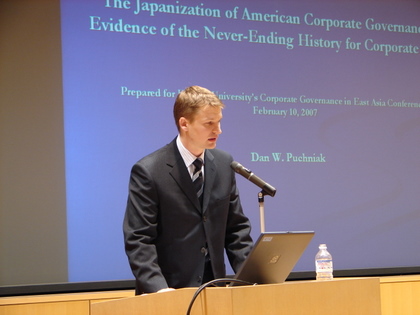The Japanization of American Corporate Governance?
Evidence of the Never-Ending History for Corporate Law
 The corporate governance convergence debate is premised on the false assumption that the American model of corporate governance has teleologically evolved to a fixed, optimally efficient, endpoint. This article demonstrates that it has not and that as such the convergence debate is fundamentally flawed and not worth fixing. The corporate governance convergence debate is premised on the false assumption that the American model of corporate governance has teleologically evolved to a fixed, optimally efficient, endpoint. This article demonstrates that it has not and that as such the convergence debate is fundamentally flawed and not worth fixing.
While all eyes remain focused on whether the world is moving towards the American shareholder primacy model, America has moved away from it. Ironically, the current American model – with its bank monitoring, ineffective hostile takeover regime and increased collective shareholding – appears to have moved towards the traditional Japanese main bank model. In the context of the convergence debate, the following question arises: Is American corporate governance converging on the traditional Japanese main bank model?
In short, the answer is no. However, this misses the point. The traditional Japanese main bank model, which two decades ago was itself viewed as an endpoint model, no longer exists. After a decade of resistance, the main bank model has recently been adapted to better fit Japan’s current conditions. This adaptation is viewed as a force behind Japan’s current economic recovery. Where Japan’s inflexibility was its downfall, America’s ability to adjust its corporate governance to fit its ever changing conditions has been its success. The last two decades has seen American corporate governance constantly adapting – using shareholder primacy to restructure in the late 1980s, director primacy to consolidate gains in the 1990s and increased bank monitoring to respond to recent challenges.
There is no magic in the American, Japanese or any other corporate governance model. If there is any magic in corporate governance it is in its ability to adapt to ever changing conditions. The corporate governance convergence debate is terminally flawed because it fails to recognize this and erroneously attempts to measure the distance between constantly evolving systems and a mythical fixed endpoint model. As such, comparative corporate governance should abandon the convergence debate and instead focus on what allows corporate governance systems to efficiently adapt to their ever changing environment.
The Corporate Governance in East Asia 2007 Conference papers were published on the Asian-Pacific Law & Policy Journal, Volume IX, Issue 1.
 Please follow this link for the downloadable (pdf) file of Mr. Puchniak's paper. Please follow this link for the downloadable (pdf) file of Mr. Puchniak's paper.
|